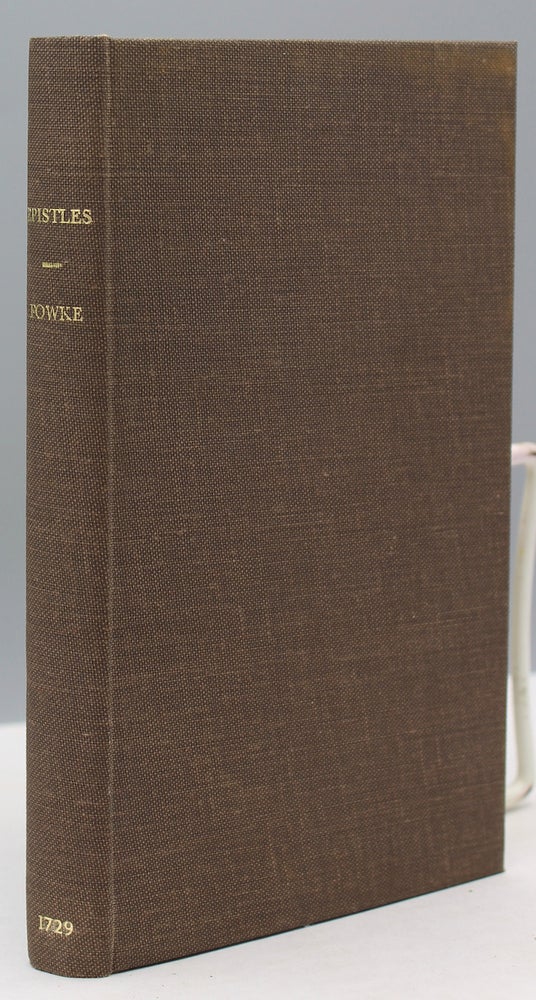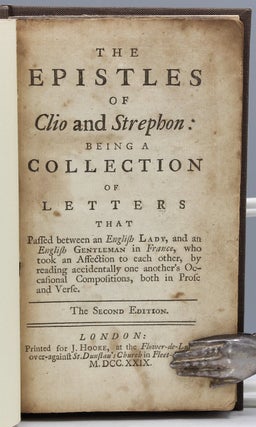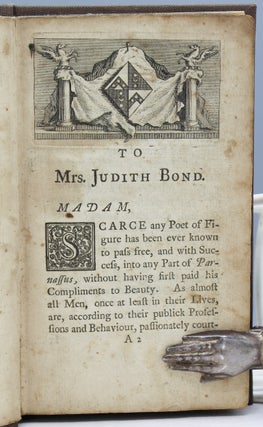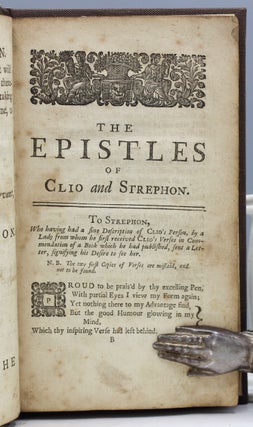The Epistles of Clio and Strephon: Being a Collection of Letters that passed between an English Lady, and an English Gentleman in France, who took an Affection to each other, by reading accidentally one another’s Occasional Compositions, both in Prose and Verse.
London: Printed for J. Hooke, 1729. Second edition, enlarged by the addition of some verses by “Strephon,” according to a reference in the text to inserting certain poems “in their proper Place, in this new Edition.” (The first edition extended to 131 pp.). Engraved armorial headpiece on A2, the start of the dedication to Judith Bond by “Strephon” (William Bond). Some foxing and soiling, tear in E1, affecting text but with no loss. Some light pencil. Rebound in modern brown cloth. Twelvemo. xxiv, 176, [4, ads] pp. Item #17015
Martha Fowke (later Sansom, 1690-1736) was the daughter of a Catholic mother and an army officer father, Thomas F., who was murdered in 1708. According to her autobiographical Clio (1752), she had a steady stream of admirers from her early teens, and, though she describes her relationships evasively, became the mistress to at least several of her suitors, probably including the Duke of Beaufort and later the Duke of Rutland. The Epistles of Clio and Strephon originally appeared in 1720. She wrote it with William Bond (d. 1735), the author of Tuscan Treaty, whose writing she admired, but whom she did not meet until after these Epistles were exchanged. She later had romances of one sort or another with Aaron Hill, Richard Savage, and John Dyer. In Eliza Haywood’s Memoirs of an Island Adjacent to the Kingdom of Utopia, Martha Fowke is characterized as “Gloatia” and accused of “incest with her father, insatiable promiscuity, prostitution, shameless infidelity to her ailing husband” (Roger Lonsdale, Eighteenth-Century Women Poets: An Oxford Anthology), and of circulating scandal “coin’d in the hellish Mint of her own brain” (Haywood). Fowke is short-changed in the traditional references. She does not have an entry in the D.N.B. There is a brief autobiography in The Feminist Companion to Literature in English, and no reference to her in Schleuter’s Encyclopedia of British Women Writers (Revised edition, 1998). Roger Lonsdale’s account in Eighteenth-Century Women Poets is the most detailed of those we could find. He calls her poetry “pleasantly individual and unpretentious.”.
All editions of this book are uncommon. ESTC lists half a dozen copies of the first edition in American institutions and eight copies of the present edition. Foxon, English Verse 1701-1750, p. 282.
Price: $600.00






